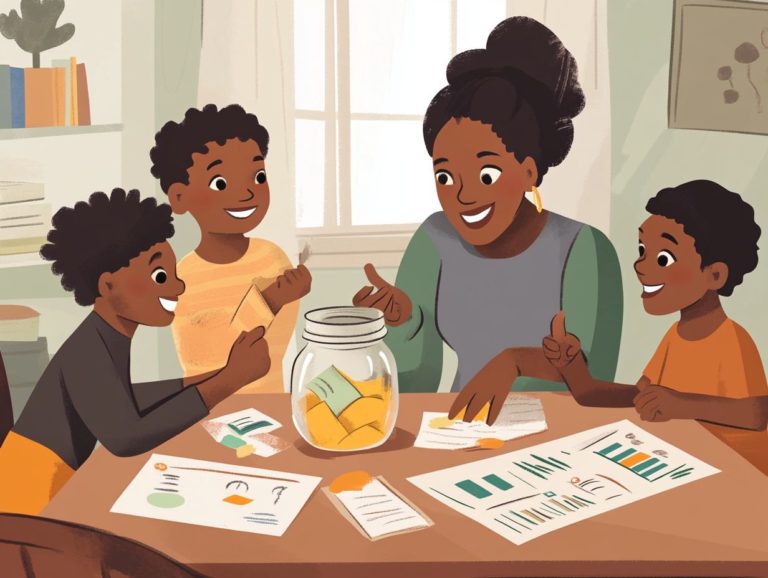How Do I Communicate My Budget to My Partner?
Navigating finances within a partnership can be quite the challenge, but it’s vital for maintaining a healthy relationship. Understanding your finances is crucial for success and lays the groundwork for open and honest communication.
From assessing your income and expenses to recognizing the impact of financial disagreements, each element holds significant importance. This guide explores effective strategies for discussing budgets, crafting a joint financial plan, and resolving conflicts.
By doing so, you ensure that both partners feel heard and respected throughout the entire process.
Contents
- Key Takeaways:
- Understanding Your Financial Situation
- Why Communication is Important
- Approaching the Conversation
- Creating a Joint Budget
- Tips for Effective Communication
- Dealing with Conflicts and Differences
- Frequently Asked Questions
- What s the Best Way to Share My Budget with My Partner?
- Why is it Important to Share My Budget with My Partner?
- How Can I Approach This Conversation Without Tension?
- What if We Have Different Spending or Saving Styles?
- How Much Financial Information Should We Share?
- What if My Partner Doesn t Want to Talk About Finances?
Key Takeaways:

- Be honest and transparent about your financial situation with your partner. This builds trust and opens communication in your relationship.
- Communicate regularly about finances to avoid conflicts and misunderstandings. Actively listen and compromise to find a solution that works for both of you.
- When creating a joint budget, discuss and set shared financial goals to ensure you are both on the same page and working towards a common future.
Understanding Your Financial Situation
Understanding your financial situation is essential as a couple, as it lays the groundwork for open communication and alignment of your financial dreams and priorities. Begin by assessing your combined income, expenses, and any existing debts, such as credit card balances or student loans.
Engaging in discussions about these elements can eliminate feelings of guilt or resentment and make strides toward shared financial goals. Transparency strengthens your relationship and paves the way for compromise and harmony on your financial journey together.
Assessing Your Income and Expenses
Assessing your income and expenses is a crucial step in effective financial planning. This allows you to gain a comprehensive understanding of your finances.
By examining your financial inflows and outflows, you and your partner can develop a clearer picture of your joint financial situation, which is vital for making informed decisions together. You can use tools like Google Sheets or budgeting apps to help track your finances.
Establishing a budget offers a structured approach to managing expenses, prioritizing savings, and planning for future goals. Transparency in your financial discussions becomes essential; how to communicate budget goals with family fosters trust and aligns both partners’ financial aspirations, setting the stage for a more harmonious financial journey.
Why Communication is Important
Effective communication is immensely significant in any couple’s relationship, particularly regarding financial discussions. It nurtures trust and understanding, serving as a powerful tool to prevent financial disagreements that could escalate into emotional distress and resentment.
Prioritizing open dialogue about finances strengthens your partnership and paves the way for a healthier, more harmonious bond.
The Impact of Financial Disagreements on Relationships
Financial disagreements can significantly affect your relationships, often breeding feelings of resentment and emotional strain. These conflicts might stir up insecurities, especially if one of you views the other as less financially responsible.
When conversations about spending habits or budgeting arise, they can quickly escalate into deeper issues of trust and support, leading to emotional distance. To navigate these challenges, open and honest communication is essential. You and your partner should express your feelings without fear of judgment, creating a safe space for meaningful dialogue. For guidance, consider exploring how to discuss expense tracking with your partner.
By actively listening to each other and collaborating on financial goals, you can cultivate understanding and strengthen your emotional connection. Ultimately, this approach can turn potential disputes into valuable opportunities for growth and unity.
Start discussing your finances today for a stronger partnership!
Approaching the Conversation

Navigating conversations about finances as a couple demands thoughtful consideration and strategic planning. It’s essential to ensure that both partners feel heard and respected, setting the stage for constructive discussions about financial matters and shared aspirations.
Setting the Right Tone and Environment
Creating a safe environment and setting the right tone are crucial when you embark on a financial conversation. This approach allows you and your partner to express feelings and concerns without the weight of judgment hanging over you.
Select a neutral location that feels comfortable for everyone involved, helping to ease any potential tension. Dedicating a specific time solely for this discussion sharpens your focus and enhances emotional safety.
Using supportive language fosters a collaborative atmosphere, inviting open sharing of ideas and fears. Acknowledging each other’s perspectives with empathy strengthens your bond and paves the way for constructive solutions, turning a daunting ordeal into a positive experience.
Creating a Joint Budget
Establishing a joint budget is crucial for couples. It enables you to align your financial goals and priorities, fostering a shared vision for your future.
By doing this, both partners can remain on the same page regarding expenses and financial decisions, creating a harmonious approach to managing money together.

Combining your finances and setting shared goals gives you and your partner the power to plan effectively for your financial future and manage resources together. This partnership simplifies your budgeting process and nurtures open communication about spending habits, savings priorities, and investment strategies.
By aligning your financial objectives, you create a unified vision that fosters accountability and collaboration. One significant advantage of merging your finances is the ability to pool resources, making it easier to tackle major goals like buying a home, planning vacations, or saving for retirement.
Establishing shared financial dreams calls for honest discussions about your aspirations and values, ensuring equal contribution to the planning process. Tools like budgeting apps which help you plan and track your spending and investment platforms can also enhance your efforts, providing an organized approach to tracking progress toward these common goals.
Tips for Effective Communication
Implementing strategies for effective communication is essential for nurturing a healthy relationship. It allows you and your partner to openly share your financial dreams, experiences, and concerns as you navigate the complexities of your finances together.
Active Listening and Compromise
Active listening and compromise are invaluable tools to navigate financial issues, ensuring both you and your partner feel valued and understood during discussions.
Engaging in conversations and focusing on each other’s perspectives creates a safe space to express concerns and emotions surrounding money. Summarizing what your partner has said confirms your understanding and clarifies any misconceptions, paving the way for more productive dialogue.
When emotions run high be it anxiety over spending or saving compromise becomes vital. It addresses differing financial priorities while fostering a sense of teamwork. Finding common ground transforms conflicts into collaborative solutions, promoting harmony and trust within your relationship.
Dealing with Conflicts and Differences
Navigating conflicts and differences related to finances is an inevitable aspect of any couple’s journey. Mastering the art of addressing these challenges can strengthen the bond between partners and cultivate a deeper sense of mutual support.
Strategies for Resolving Disagreements
Resolving financial disagreements can transform your relationship! Effective communication between partners enhances emotional connections.
To do this, establish clear ground rules for financial discussions. This ensures both partners feel safe and heard.
Understanding each other’s feelings is key. Recognizing emotions helps in navigating sensitive topics with empathy.
Consider seeking support from financial experts or relationship counselors. Their impartial perspective can provide tailored solutions and foster collaboration.
These strategies not only reduce conflict but also strengthen your partnership. They pave the way for healthier financial habits and emotional bonds.
Frequently Asked Questions
Start by having an open and honest conversation about your financial goals and priorities.

Understanding each other’s finances builds trust and helps prevent future conflicts.
How Can I Approach This Conversation Without Tension?
Choose a calm moment to talk. Use “I” statements to express your feelings without blaming your partner.
What if We Have Different Spending or Saving Styles?
Listen to each other’s perspectives. Find a compromise, like creating a joint budget or separate fun money accounts.
Decide together how much to share. Transparency strengthens your relationship.
What if My Partner Doesn t Want to Talk About Finances?
Gently explain why it’s important to you. If needed, consider involving a financial expert or counselor to help with the conversation.






